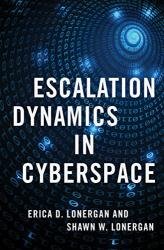Escalation Dynamics in Cyberspace
- Добавил: literator
- Дата: 11-04-2023, 16:01
- Комментариев: 0
 Название: Escalation Dynamics in Cyberspace
Название: Escalation Dynamics in CyberspaceАвтор: Erica D. Lonergan, Shawn W. Lonergan
Издательство: Oxford University Press
Год: 2023
Страниц: 273
Язык: английский
Формат: pdf (true), epub
Размер: 16.4 MB
To what extent do cyberspace operations increase the risks of escalation between nation-state rivals? Scholars and practitioners have been concerned about cyber escalation for decades, but the question remains hotly debated. The issue is increasingly important for international politics as more states develop and employ offensive cyber capabilities, and as the international system is increasingly characterized by emergent multipolarity.
In Escalation Dynamics in Cyberspace, Erica D. Lonergan and Shawn W. Lonergan tackle this question head-on, presenting a comprehensive theory that explains the conditions under which cyber operations may lead to escalation. In doing so, they challenge long-held assumptions about strategic interactions in cyberspace, arguing that cyberspace is not as dangerous as the conventional wisdom might suggest. In some cases, cyber operations could even facilitate the de-escalation of international crises. To support their claims, Lonergan and Lonergan test their theory against a range of in-depth case studies, including strategic interactions between the United States and key rivals; a series of case studies of the role of cyber operations in international crises; and plausible future scenarios involving cyber operations during conflict. They then apply their analytical insights to policymaking, making the case that skepticism is warranted about the overall efficacy of employing cyber power for strategic ends. By exploring the role of cyber operations in routine competition, crises, and warfighting, Escalation Dynamics in Cyberspace presents nuanced insights about how cyberspace affects international politics.
This book speaks to one of the central questions of cyber strategy, namely, to what extent do cyberspace operations increase the risks of escalation between nation-state rivals? While scholars and practitioners have been concerned about escalation dynamics in cyberspace for decades, the question remains insufficiently answered. Moreover, the extent to which cyber operations lead to escalation has growing relevance for international politics as more states develop and employ offensive cyber capabilities and as the international system is increasingly characterized by emergent multipolarity.
Whether and how emerging technologies might contribute to international stability is a pervasive question for scholars and policymakers. Academic efforts to understand and make predictions about escalation dynamics crystallized during the Cold War and became particularly acute during the Cuban Missile Crisis when the threat of nuclear annihilation was suddenly made quite real. Richard Smoke notes that the concept of escalation “did not appear in dictionaries, in military or scholarly literature, or in the public statements of government officials, before about 1960.”
Contents:
Скачать Escalation Dynamics in Cyberspace
Внимание
Уважаемый посетитель, Вы зашли на сайт как незарегистрированный пользователь.
Мы рекомендуем Вам зарегистрироваться либо войти на сайт под своим именем.
Уважаемый посетитель, Вы зашли на сайт как незарегистрированный пользователь.
Мы рекомендуем Вам зарегистрироваться либо войти на сайт под своим именем.
Информация
Посетители, находящиеся в группе Гости, не могут оставлять комментарии к данной публикации.
Посетители, находящиеся в группе Гости, не могут оставлять комментарии к данной публикации.

